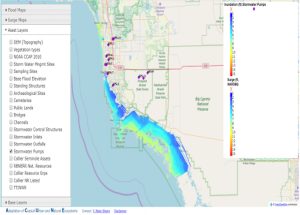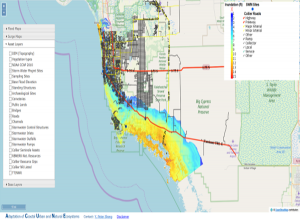
Southwest Florida contains the largest area of tidally influenced public lands in the Gulf of Mexico and the fastest growing urban landscape in Florida. Both the human and naturally-occurring components of the ecosystem are under increasing risk due to the threats of a growing human population, sea level rise, and tropical cyclones. With support for the NOAA RESTORE Science Program, a team, led by Dr. Peter Sheng, developed a decision-support tool to aid resource managers in adapting to future saltwater intrusion in estuaries and their associated habitats. The tool, entitled Adaptation of Coastal Urban and Natural Ecosystems (ACUNE), is a web-based interactive decision-support tool that will be used to inform decisions in coastal planning, zoning, land acquisition, and restoration. Throughout the development process of the tool, the project team has maintained excellent communication and collaboration with end users. This emphasis on outstanding communication is expected to lead to increased tool usage.
To facilitate the adoption of ACUNE, Dr. Sheng and his team have included end users in the development of the tool. They have given demonstrations and solicited feedback from end users, including natural resource managers at Collier County and the City of Naples, at workshops organized by the team, city council meetings, and other meetings, as well as through regular correspondence. For example, Dr. Stephanie Molloy, Natural Resources Manager at The City of Naples, says she provided feedback on “the sea level rise projections to be used.” A select group of natural resource managers were even asked to evaluate the outputs of the tool.
Dr. Sheng and David Kidwell, who is a program manager for NOAA’s National Centers for Coastal Ocean Science, agree that the success of efforts to facilitate end user adoption requires building relationships over many years and establishing trust. Dr. Sheng says this project would not have been possible without the team’s “dedicated and energetic” Coordination/Communications Lead, Dr. Michael Savarese, who led relationship development with end users. Having gained the end users’ trust ACUNE is on track to be extensively utilized by natural resource managers throughout Southwest Florida. Dr. Molloy says, once the tool is available, Naples will utilize it in the next phase of their Climate Change Adaptation and Mitigation Action Plan. Effective communication is as important to the success of the ACUNE project as the quality of the decision-support tool itself.
The webtool is currently under maintenance and migration to a new website. Interested parties should contact Dr. Sheng about the possibility to more closely examine the ACUNE webtool, when it becomes available in September. A couple sample maps are shown below.


For more information on the project visit:
https://restoreactscienceprogram.noaa.gov/projects/local-coastal-tool
 Official websites use.gov
A .gov website belongs to an official government organization in the United States.
Official websites use.gov
A .gov website belongs to an official government organization in the United States.
 Secure .gov websites use HTTPS
A lock or https:// means you’ve safely connected to the .gov website. Share sensitive information only on official, secure websites.
Secure .gov websites use HTTPS
A lock or https:// means you’ve safely connected to the .gov website. Share sensitive information only on official, secure websites.